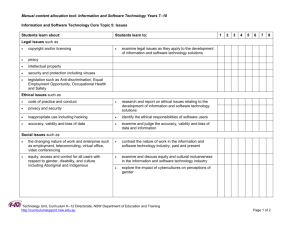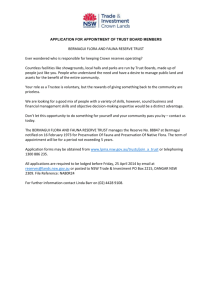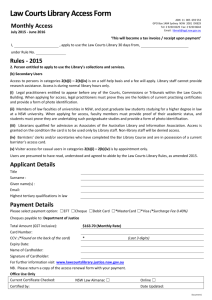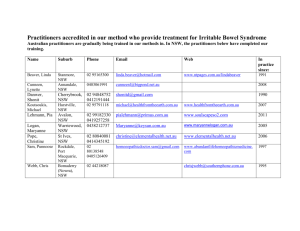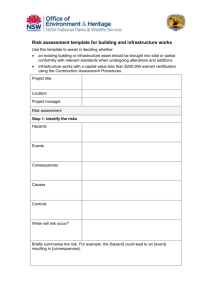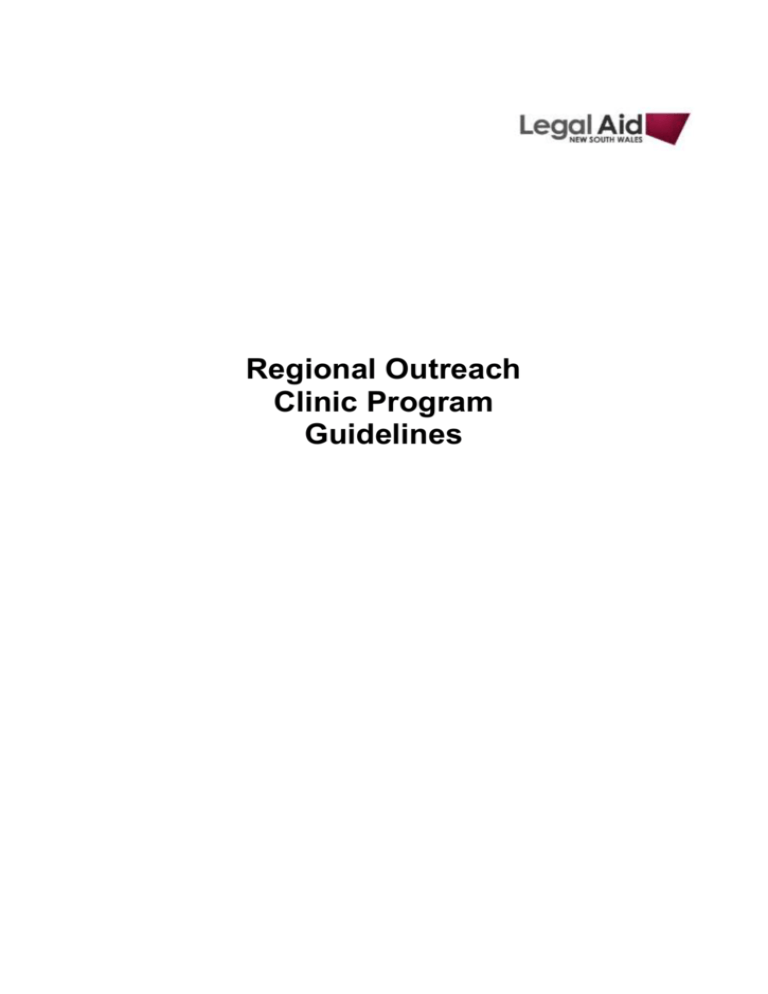
Regional Outreach
Clinic Program
Guidelines
Regional Outreach Clinic Program Guidelines
Released: September 2010
All rights reserved
1.
Introduction
Legal Aid NSW is committed to prioritising services for those at risk of greatest risk of
social exclusion.
"Social exclusion" involves the lack or denial of resources, rights, goods and services,
and inability of an individual to participate in the normal relationships and activities
available to the majority of people in a society, whether in the economic, social, cultural
or political arenas. It affects both the quality of life of individuals and the equity and
cohesion of society as a whole.
Legal Aid NSW commitment to addressing social exclusion includes developing new
service responses to groups at risk and to providing these in partnership with other
legal service providers such as private practitioners, the Aboriginal Legal Service and
community legal centres.
Many issues that commonly face our clients such as family breakdown, credit and
housing issues, isolation, discrimination and exclusion from services have a legal
dimension that if not resolved, will lead to social exclusion. People living in rural and
remote areas in NSW have particular difficulty accessing legal services.
The Regional Outreach Clinic Program (ROCP) commenced in September 2009 with
private or Community Legal Centre lawyers in regional and remote NSW providing
monthly advice and minor assistance outreach clinics in regional and remote locations
around NSW on a fee-for-service basis.
Clinic locations are selected on the basis of high socio–economic disadvantage and
comparative low access to free legal services.
Lawyers are selected following an expression of interest process.
Legal Aid NSW is currently seeking expressions of interest from legal service providers
to provide experienced practitioners to run monthly or fortnightly advice and minor
assistance outreach clinics in an additional six (6) locations around NSW.
An important component of the expanded program is its focus on developing and
promoting best practice in the provision of quality ROCP services through training,
resources and the provision of professional support to participating practitioners.
2.
Regional Outreach Clinic Program Objectives
The objects of the ROCP are to:
1. Provide regular access to sustainable, regular and effective advice and minor
assistance legal services to people at risk of social exclusion living regional, rural
and remote areas of NSW.
2. Develop and promote best practice in the provision of quality advice and minor
assistance legal services to people at risk of social exclusion living regional, rural
and remote areas of NSW, through the provision of training, resources and
professional support to practitioners participating in the program.
Regional Outreach Clinic Program Guidelines 2010
3
3.
Program Overview
Under the Regional Outreach Clinic Program, Legal Aid NSW will pay an experienced
practitioner (in sole practice or employed by a legal service provider) to provide legal
advice and minor assistance clinics in selected regional, rural or remote locations.
The clinics involve 20–30 minute appointments for clients wishing to obtain legal advice
and minor assistance at a designated location. The frequency of the clinics (whether
monthly or fortnightly) will be negotiated with Legal Aid NSW taking into account the
availability of agencies to host the clinic and the distance of travel for the practitioner to
and from the clinic location.
The participating practitioner will be required to undertake work in the jurisdictions and
law types identified by Legal Aid NSW as needed in that particular location, but the key
focus area of work will be civil law.
The clinic location will be organised and promoted by Legal Aid NSW and will most
likely be in a local community organisation such as a neighbourhood centre.
Appointments will be arranged directly with the participating practitioner so that
appropriate conflict checks can be made.
In some locations, the clinics may also work in tandem with an outreach service in
another area of law provided by an Aboriginal Legal Service, Community Legal Centre
or Legal Aid NSW.
The Regional Outreach Clinic Program will be funded until June 2014 in each region,
subject to satisfactory service delivery by the legal service provider.
4.
Identification of locations for inclusion in the Regional
Outreach Clinic Program
Clinic locations are chosen on the basis of the following factors:
Locations characterised by high socio-economic disadvantage;
Evidence of legal need – including unmet or emerging legal need;
and
The kinds of legal aid or other public legal assistance work already
being undertaken in each region.
This is done using a range of information sources and tools including research on
social exclusion, socio–economic disadvantage and remoteness and access to
services. This includes the Australian Bureau of Statistics Socio–Economic Indexes for
Areas (SEIFA) Professor Tony Vinson in his report Dropping Off the Edge – the
distribution of disadvantage in Australia (2007), the coverage of these areas by Legal
Aid NSW family and civil law services, Law and Justice Foundation of NSW research
on the legal needs of disadvantaged groups, and other information such as data from
private practitioners currently undertaking legal aid work, including data on the
operation of the ROCP.
In addition, Legal Aid NSW also uses information collected through its regional offices
and evidence of unmet legal need identified through the work of the Cooperative Legal
Service Delivery Program. For more information on the Cooperative Legal Service
Delivery Program see: http://www.legalaid.nsw.gov.au/asp/index.asp?pgid=708
During the period of the Contract, Legal Aid NSW will monitor whether the Service is
meeting the aims of the ROCP. Where Legal Aid NSW is of the view that these aims
are not being met due to circumstances beyond the participating practitioner’s control
Regional Outreach Clinic Program Guidelines 2010
(for example, low client uptake), Legal Aid NSW will work with the participating
Practitioner to improve the Service. Participating practitioners will need to be
reasonably flexible in relation to any proposed changes to the Service delivery model,
which could include, for example, the Service being moved to a different location.
5.
Selection of legal service providers for the Regional
Outreach Clinic Program
Legal service providers seeking to participate in the Regional Outreach Clinic Program
must address the following selection criteria:
1. Capacity to provide a practitioner with a current Law Society of New South
Wales or New South Wales Bar Association Practising Certificate.
2. Demonstrated commitment to provide legal services to clients at risk of social
exclusion in your region. This includes providing a referee who will be able to
confirm the participating practitioner’s skills, qualifications and experience to
undertake ROCP work and their capacity to work effectively and sensitively with
clients at risk of social exclusion.
3. Extent of the participating practitioner’s experience in one or more of the
following areas of law: civil, family, care and protection.
4. Demonstrated experience of the participating practitioner in undertaking legal
aid work and in understanding the policies and procedures of Legal Aid NSW.
5. Capacity and commitment of legal service provider’s participating practitioner to
regularly travel to and from the outreach location to conduct the advice and
minor assistance clinic.
6. Membership of the participating practitioner on one or more Legal Aid NSW
practitioner panels or willingness to apply for membership (applicants should
indicate which panels).
7. Willingness to comply with the Regional Outreach Clinic Program Guidelines
and Contract, including record-keeping and reporting requirements.
8. Commitment of the legal service provider to ensuring that the participating
practitioner participates in induction and other relevant professional
development opportunities, such as attendances at relevant Legal Aid NSW
conferences.
Legal Aid NSW will consider all expressions of interest and make a determination on
the basis of the relative merit of each application against each of the selection criteria.
6.
Fees Payable
The legal service provider will be paid for advice and minor assistance services on a
fee–for–service basis as well as any associated travel costs which are negotiated with
Legal Aid NSW.
The frequency and hours of the clinic will be negotiated with Legal Aid NSW and may
depend on the distance between the clinic and the legal service provider’s location.
Legal Aid NSW will pay for the administrative and associated costs of the clinic
location.
Regional Outreach Clinic Program Guidelines 2010
Should a client require assistance beyond legal advice and minor assistance provided
at the clinic, Legal Aid NSW will pay participating practitioners for additional legal
representation work undertaken for clients granted legal aid in accordance with the
Legal Aid NSW fee scale for private practitioners.
The legal service provider will be responsible for maintaining the participating
practitioner’s professional indemnity insurance, the cost of maintaining a practising
certificate and/or achieving specialist accreditation in any area.
7.
Clinic Promotion
Legal Aid NSW will choose the locations to host the clinic and will promote the clinics.
Legal Aid NSW will pay for the costs for promoting the clinics. Legal Aid NSW will make
any promotional materials available to the legal service provider. The legal service
provider is encouraged to promote service, where possible through their own local
networks and through face-to-face meetings.
Where on clinic days not all the clinic appointments have been taken up, the
participating practitioner has an obligation to use that time to familiarise themselves
with the local community and promote the service to local organisations.
8.
Training, Resources, and Professional Support
A key component of the expanded ROCP is the provision of training, resources,
professional support, and developmental opportunities for participating practitioners.
This includes establishing arrangements with our in–house Crime, Family, and Civil
Law Programs for the provision of back–up advice, mentoring opportunities for
participating practitioners and training and other developmental opportunities such as
attendance at Legal Aid NSW conferences.
Participating practitioners also have access to an experienced Legal Aid NSW officer
for advice on legal aid policies and related issues. Legal Aid NSW will provide the
participating practitioner with free admission to any legal aid conference, seminar or
training session. All participating practitioners will have access to the Legal Aid NSW
e-learning facilities.
9.
Probationary Period
The legal service provider’s participation in the Regional Outreach Clinic Program is
subject to a six–month probation period. The contract can be terminated at any time
during the probationary period, and at any other time should the legal service provider
fail to comply with the contract.
10. Work to be Performed
The participating practitioner is required to provide legal advice and minor assistance
services for clients who attend the clinic, unless a conflict of interest exists.
The practitioner should take steps to avoid a potential conflict of interest and notify the
client prior to their attendance at the clinic, where a conflict exists. In such cases the
Regional Outreach Clinic Program Guidelines 2010
practitioner should refer the client to another legal service (such as LawAccess NSW)
which is able to assist the client.
The work includes advice and minor assistance in areas of law that Legal Aid NSW
identifies as a priority for the location. For example, if Legal Aid NSW has identified a
need for legal advice and minor assistance in civil law work, the participating
practitioner will be required to undertake that work.
The participating practitioner will be required to attend the clinic on the agreed date/s,
and will be responsible for managing bookings and conflicts checks. The participating
practitioner may also accept legal aid clients seeking legal representation as a result of
a direct approach from the client or following a referral from the Legal Aid NSW,
LawAccess NSW or other referring agency approved by Legal Aid NSW.
Responsibilities to clients
A practitioner providing legal advice and minor assistance services for clients through
an ROCP clinic will:
Provide information and referral;
Observe the principles governing the practitioner/client relationship and the
privacy of instructions provided by the client.
Provide an efficient, ethical and high quality service in accordance with the Law
Society of NSW Professional Conduct and Practice Rules.
Advise the client of the availability of legal aid and, where appropriate, assist the
client to complete an application for legal aid.
Where the practitioner assists a client to complete an application for legal aid
they are to ensure that the client’s application for legal aid is lodged promptly with
all relevant information and supporting material provided in the application form.
Advise the client on the law, procedure and practice applying to the matter and
give the client a candid opinion on the weakness and strength of their matter.
Use a qualified interpreter where necessary.
Communicate with the client in a way that the client understands using language
appropriate to the age, education and cultural background of the client.
Keep detailed notes of information, advice or minor assistance given to a client
that is not confirmed in writing.
Any additional casework or representation work undertaken on a grant of aid must
comply with Legal Aid NSW policies and guidelines. Fees for legal aid services for
which a grant of aid is made will be paid in accordance with the Legal Aid NSW fee
scale.
The participating practitioner will be required to apply for membership of one or more
Legal Aid NSW panels, and enter into the relevant service agreements for membership
of such panels; such membership should continue for the duration of the ROCP
contract. Legal Aid NSW expects the participating practitioner to become a member of
one or more Legal Aid NSW panels relevant to the law types identified by Legal Aid
NSW as a priority in the region as soon as practicable after the commencement date of
the ROCP contract.
Regional Outreach Clinic Program Guidelines 2010
11. Referrals to LawAccess NSW
LawAccess NSW is a free government telephone service that provides legal
information, advice and referrals for people who have a legal problem in NSW.
Clients in need of legal information (as opposed to legal advice and minor assistance)
should be referred in the first instance to LawAccess NSW on 1300 888 529 or
http://www.lawaccess.nsw.gov.au/ for assistance. This frees up the practitioner’s time to
provide face-to-face legal advice and minor assistance.
It is important to manage client expectations about what will happen when they are
referred to LawAccess NSW. Not all clients will speak to a lawyer when they call
LawAccess NSW. All calls are answered by a Customer Service Officer who will
identify what type and level of assistance the person needs.
When referring a client to LawAccess NSW the following information should be
provided to the client:
“The first thing you need to do is call LawAccess NSW. LawAccess NSW is a
telephone service that can give you information about your legal inquiry
and help you work our what type of legal assistance you need. After
speaking with you, LawAccess may refer you back to us for an appointment
for legal advice.”
12. Client Referrals
Participating practitioners rely on cooperative and collaborative working relationships
with key ROCP partners in order to provide effective referrals for clients in need of
further assistance.
The ROCP's key partners are:
LawAccess NSW: http://www.lawaccess.nsw.gov.au/ (see above)
Legal Aid NSW: http://www.legalaid.nsw.gov.au/
Community Legal Centres: http://www.clcnsw.org.au//index.php/
Aboriginal Legal Service: http://www.alsnswact.org.au/
Local Courts:
http://www.lawlink.nsw.gov.au/lawlink/local_courts/ll_localcourts.nsf/p
ages/lc_index/
Women’s Domestic Violence Court Advocacy Services:
http://www.legalaid.nsw.gov.au/asp/index.asp?pgid=597
Tenants Advice and Advocacy Services: http://www.tenants.org.au/
Members of the local legal profession and
Other non–Government and Government organisations, which
provide services to disadvantaged people and which may be a source
of referrals, eg Centrelink, migrant resource centres, family support
services.
Regional Outreach Clinic Program Guidelines 2010
Casework and representation referrals
Where a matter involves additional casework or representation work and the client is
eligible for legal aid but the participating practitioner/legal service provider is unable to
take the matter on, the matter should be referred to the Solicitor-in-Charge of the
nearest Legal Aid Office.
Other referrals
The participating practitioner should also consider making a referral where the client is
in need of:
Community based legal assistance or Aboriginal specific legal
services (e.g. Community Legal Centres, Aboriginal Legal Service
(NSW/ACT) Ltd or Aboriginal Family Violence Prevention Legal
Service);
Housing services (eg emergency accommodation, refuges, Housing
NSW);
Counselling and emotional and practical support services (such as
professional counsellors, family support services, Mensline);
Financial assistance services (eg financial counsellors, Centrelink).
Wherever possible ‘warm referrals’ (referrals in which the participating practitioner
introduces the client to the referee agency) should be made.
These working relationships are important not only in ensuring that participating
practitioners receive and are able to make effective client referrals, they also ensure
the effective and efficient operation of the justice system and client outcomes.
13. Monitoring, Record-keeping, Reporting, and Evaluation
At three–monthly intervals, the legal service provider will be required to submit to Legal
Aid NSW a report specifying the amount and type of work undertaken under the
Regional Outreach Clinic Program in the form prescribed by Legal Aid NSW.
The report will provide the formal framework for feedback and discussion on the work
performed by the participating practitioner during the probationary period and beyond.
Legal Aid NSW monitors the operation of the program. The participating practitioner
must retain records of all work undertaken including the area of the law, the matter type
and the approximate time associated with the work as well as statistical and other data
on client services delivered through the clinics in the form prescribed by Legal Aid
NSW.
Legal Aid NSW also evaluates the effectiveness of the Program for its impact on
service delivery and for its operational costs and benefits. Legal service providers and
their participating practitioners may be asked to complete survey documents,
participate in interviews and other processes that may be undertaken as part of this
evaluation.
Legal Aid NSW may from time to time conduct audits of the participating practitioner’s
files to confirm that any work undertaken on behalf of Legal Aid NSW complies with
Legal Aid NSW policies, guidelines and procedures.
Regional Outreach Clinic Program Guidelines 2010
14. Confidentiality
All legal service providers and participating practitioners are required to comply with the
confidentiality and privacy obligations of Legal Aid NSW. Any information that they
provide to Legal Aid NSW in respect of their obligations under these guidelines may be
subject to disclosure in response to questions in Parliament or freedom of information
requests.
15. Complaints
A complaint may relate to the quality of services provided, or to the diligence,
competency, behaviour, or attitude of the participating practitioner. Complaints
generally represent an opportunity to improve a service’s practices and procedures.
Legal service providers should have in place a formal complaints handling process to
manage all complaints, including complaints received from:
ROCP clients;
ROCP host agency staff; and
Referral agencies.
The complaints handling process must be accessible and transparent.
Where Legal Aid NSW receives a complaint about a participating practitioner, Legal Aid
NSW will, with the consent of the complainant, forward a copy of the complaint to the
Principal Practitioner of the legal service provider for resolution and seek a report on
the outcome of the complaint.
Legal Aid NSW will not investigate a complaint unless it raises a potential breach of the
ROCP Contract or ROCP Guidelines.
Where a complaint involves a potential breach of the professional rules made and
published by the Law Society of New South Wales or the New South Wales Bar
Association, the complaint may be referred to the Office of the Legal Services
Commissioner.
16. Further Information
Further information on the operation of the Regional Outreach Clinic Program may be
obtained from Legal Aid NSW by contacting:
Louise Blazejowska (02) 9219–5983 or
louise.blazejowska@legalaid.nsw.gov.au
Jenny Lovric (02) 9219–5102 or jenny.lovric@legalaid.nsw.gov.au
Regional Outreach Clinic Program Guidelines 2010


